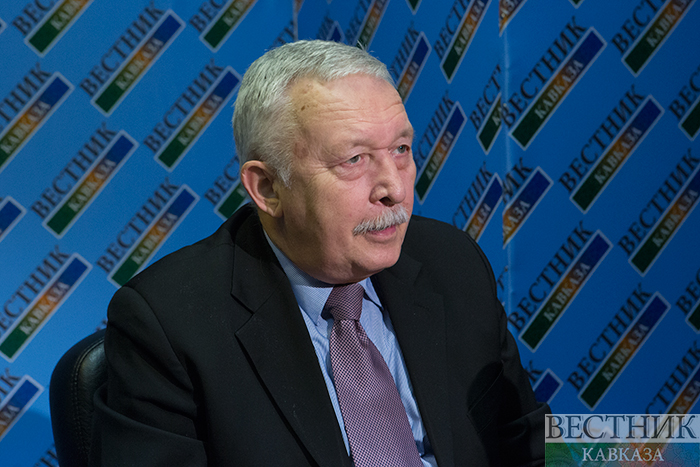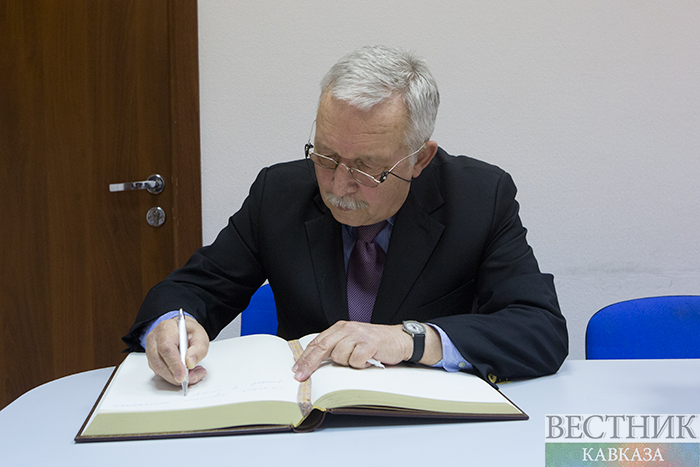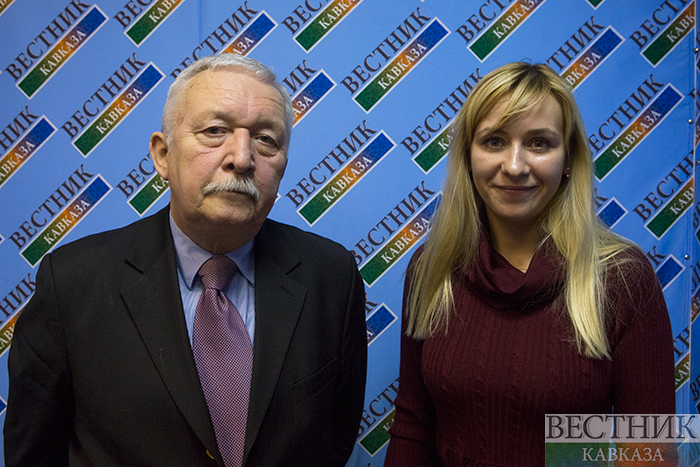Senior lecturer of the World Economics and World Politics Department at the Department of Oriental Studies of the Higher School of Economics, diplomat Vladimir Zakharov told Vestnik Kavkaza about the prospects of the Russian-Chinese cooperation and regional transport projects. See Part 1 Vladimir Zakharov: "We will always be friends with China"
- The order withdrawing the country from the Trans-Pacific Partnership (TPP) trade deal was one of the first decrees signed by Donald Trump after his inauguration. Does it mean that China will promote its integration projects to fill the place made vacant?
- The TTP project was a noumenon for China. They were not invited there. Therefore, Trump's sharp reversal clearly puzzled them. In parallel to the TTP, China has made its own project - the Regional Comprehensive Economic Partnership, involving virtually the same countries that participated in the TTP. China has not yet outlived its astonishment at this bold American trick, which identified a number of problems existing in multilateral economic relations in the Asia-Pacific region. They must understand what they will get from it and what dividends they can obtain from America's withdrawal from the sphere of multilateral cooperation and moving to only a bilateral cooperation.
The TTP was agreed at the legal level between 12 states. And all the 12 states have actively participated in this project. While China's initiatives are unilateral, which the Chinese side agrees only in the part which concerns the railways or other highways, being constructed with the help of the Chinese. The difficulty is there is no multilateral legal framework for their implementation. The Chinese project involves only one basis - unilateral, therefore, it is difficult to negotiate with them. Although two years ago, the slogan about pairing the Eurasian Economic Union with the Chinese initiative was raised, but the initiative is always individual. But the project is creating certain financial opportunities. As part of this major Chinese initiative they established the Bank of infrastructure investment and the fund. In the case of the bank is was 100 billion dollars, in the case of the fund - 40 billion dollars. There is no information yet about the connection between these financial projects and Russia. We know that China intends to cooperate with Russia on the construction of the high-speed railway 'Moscow-Kazan', and (there is such a fantastic project) after Kazan this highway will be continued almost to Beijing through the territory of Kazakhstan.
But still there are a lot of mysteries here. Who will invest the money, who will give a guarantee. The problem rests in our legislation. If we make any promises, give some advances asked by a Chinese businessman, if these guarantees are given by the Russian government, formally the funds that we need to ensure should be provided in the Russian budget. Thus we stand as a solid, serious partner for all those investing in Russia. But we can give such guarantees not for each project, not for each investments. There are all sorts of obstacles. Therefore, it is necessary to start concrete work on implementation of investment projects both on the territory of Russia and China.

- Is it about projects in the Russian Far East?
- We are trying to attract investments from China, South Korea and Japan to our projects in the Far East. I was recently in Sakhalin, and I was struck by one thing, if we talk about investment and mortgage business - the Japanese and the Koreans are the first, and the Chinese are not seen in Sakhalin. Port of Vladivostok is declared a free port, we are creating favorable conditions for foreign businesses, but the living Chinese participation is not felt there as well. Although the construction of routes between northeast China and the Far East could provide Chinese businesses and Chinese provinces sooner export of Chinese goods from the interior provinces of China to the ports through which they can then be exported to other countries.
It is important here to work flexibly. We have created the ministry, which is engaged in the development of the Far East. We must clearly work out the conditions of visa-free stay of Chinese, Japanese and Korean businessmen. In addition, we need to give clear guarantees (legal, financial, administrative) for those who want to invest in these zones of advanced development in our territory, so they can feel that they are safe, that the money which they are investing can be withdrawn in the form of dividends on appropriate terms outside of our country. It requires a constant in-depth work with a business which is interested.
Five years ago, we have agreed at the bilateral level that we will mutually promote the development of China's north-east, and the Chinese side will contribute to the development of the Far Eastern regions of our country. After these kind words and wishes nobody did anything. We have to work hard here. Projects should be developed and their implementation should be guaranteed for foreign businessmen who will invest in the construction of these facilities. Chinese businessmen often complain that Russian projects either raw, or not ready.
Today the economic vector of Russia is directed towards the West, it comes from those volumes that characterize the trade of the Russian Federation with the outside world. If we take the Chinese vector, the main markets for China are the US (600 billion dollars), Western Europe (650 billion dollars), Japan (300-400 billion dollars) and South Korea (300 billion dollars). That is, while our vectors are pointing in different directions. But strategically we feel ourselves like the countries, which are back-to-back in terms of security. The main thing is to maintain this level of security, so we would not distract our strategic capabilities.

- For a long time, your activity has been associated with various aspects of the SCO. Are there real prospects for this organization to enter any new areas of cooperation in the present circumstances? For example, the South Caucasus?
- The organization was created by the decision of heads of the six states in 2001, 2-3 months prior to the events of September 11. Then the terrorist threat, which emanated from Afghanistan and could spill over into the Central Asian region, was brewing. In this sense, the common desire of states to counter this threat was very important. But it was announced from the beginning that the SCO is an organization of a multifaceted cooperation. It has three cooperation profiles. The first is the field of security, political co-operation, the fight against terrorism, extremism and separatism. The second is an economic cooperation. The third is a humanitarian cooperation. These areas are developing with a multi-speed method. The most advanced is cooperation in the field of security, political cooperation. In terms of development, I would put the cooperation in the humanitarian sphere to a second place and the economic cooperation to the third place, as the most lame.
Obviously, according to our minister, the organization has no integration framework. Integration involves free movement of capitals, labor force, transfer of certain management areas to the supranational level. The SCO states are not ready for it today, first of all, the Central Asian states, which very value their independence, their sovereignty. To some extent the lack of an integration framework hinders the development of cooperation in the economic sphere. While a bilateral cooperation does not fit into the legal framework and the framework of the SCO economic cooperation.
There are also technical problems. For example, for many years we have said the Bank of the SCO development should be created, a bank, which could provide money for a proper feasibility study of various projects. Any project requires a feasibility study, and it is unclear when these structures could be created. The idea is that one structure could lead project activities, and the second could contribute to the implementation of these projects. We are solving this issue.
There is another large and interesting perspective - a perspective of the two big Asian countries - India and Pakistan - joining the SCO, which have applied. The principal decision was made last year, and now Pakistan and India should undergo a legal stage of their rapprochement with the SCO, that is, the parliaments of these countries must apply 30 documents developed by the SCO countries to create their legal basis. Of course, many ask whether the SCO will be more stable, more robust, if India and Pakistan join it. The is no unequivocal answer, you can only make suggestions, because it is quite possible that after the entry of India and Pakistan, the "bacillus", which provokes conflicts in the confrontation between Pakistan and India, also has a chance to get inside the SCO. If there is opposition within the organization itself, it will not bring good. Inviting two largest state to join the organization, they need to put certain conditions for them, ask them to develop their peaceful cooperation and do not bring the problems that exist between them into the organization.

As for the Caucasus, the two countries - Azerbaijan and Armenia - almost simultaneously made a bid to join the SCO as dialogue partners. the applications were accepted. Today, along with other countries (Turkey, Sri Lanka, Cambodia) they are dialogue partners of the SCO. The status of a "dialogue partner" is not very flexible. It involves the participation of various countries in economic cooperation, humanitarian cooperation, in political cooperation on a number of points, but it does not suggest their presence in the forums or the summits of the SCO heads of state. They have no right to participate in the development of some documents. Therefore, it is a friendly gesture. It would be interesting if there were relevant initiatives towards the SCO. If there are any urgent problems, any current projects, the SCO could consider them and participate in the development of cooperation with the countries of the Caucasus.
In particular, there is a Chinese project, which suggests that one of the rail routes can go through Central Asia, across the Caspian Sea, via Baku and Georgia. But there are technical difficulties. First, there are different track widths in various countries. Second, there is the issue of customs enforcement network at all this route, because the train crosses a number of boundaries. If it goes through Kazakhstan and Russia, it is in the EEU space where customs procedures are simplified, but Azerbaijan and Georgia require customs clearance of goods. It is a formal issue, but it complicates the movement and reduces the movement speed of these trains. It may be promising if it concerns some bilateral deliveries.
Meanwhile, the large-scale North-South corridor project involves the construction of infrastructure, logistics, which would link Russia and Northern Europe via the Caucasus, and then Azerbaijan and Iran via Georgia, and then reach the Persian Gulf. In some cases, it is even about the establishment of a link across the Caspian Sea, which would come up to the Persian Gulf. Therefore, in this case, everything will be decided at the commercial, technical level. Largely, the North-South project could solve the problems of road junctions involving all the interested countries in the region. I think that all of them are interested in it, because it could pave the way to both India and strengthening of transport services between India, Pakistan and the countries in the Eurasian part of this space.






